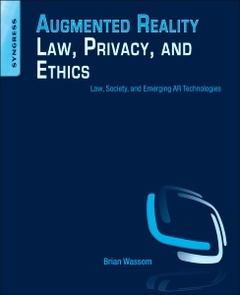Augmented Reality Law, Privacy, and Ethics Law, Society, and Emerging AR Technologies
Auteur : Wassom Brian

Augmented Reality (AR) is the blending of digital information in a real-world environment. A common example can be seen during any televised football game, in which information about the game is digitally overlaid on the field as the players move and position themselves. Another application is Google Glass, which enables users to see AR graphics and information about their location and surroundings on the lenses of their "digital eyewear", changing in real-time as they move about.
Augmented Reality Law, Privacy, and Ethics is the first book to examine the social, legal, and ethical issues surrounding AR technology. Digital eyewear products have very recently thrust this rapidly-expanding field into the mainstream, but the technology is so much more than those devices. Industry analysts have dubbed AR the "eighth mass medium" of communications. Science fiction movies have shown us the promise of this technology for decades, and now our capabilities are finally catching up to that vision.
Augmented Reality will influence society as fundamentally as the Internet itself has done, and such a powerful medium cannot help but radically affect the laws and norms that govern society. No author is as uniquely qualified to provide a big-picture forecast and guidebook for these developments as Brian Wassom. A practicing attorney, he has been writing on AR law since 2007 and has established himself as the world's foremost thought leader on the intersection of law, ethics, privacy, and AR. Augmented Reality professionals around the world follow his Augmented Legality® blog. This book collects and expands upon the best ideas expressed in that blog, and sets them in the context of a big-picture forecast of how AR is shaping all aspects of society.
Part A - Understanding the Landscape
1. What is "AR Law," and Why Should I Care
2. A Summary of AR Technology.
Part B - AR & the Law
3. Privacy.
4. Advertising, Marketing & eCommerce.
5. Intellectual Property.
6. Real Property Rights.
7. Torts and Personal Injury.
8. Criminal Law.
9. Civil Rights.
10. Litigation Procedure.
Part C - AR & Society
11. Politics & Civil Society.
12. Personal Ethics.
13. Addiction & Pornography.
- Augmented reality thought-leader Brian Wassom provides you with insight into how AR is changing our world socially, ethically, and legally.
- Includes current examples, case studies, and legal cases from the frontiers of AR technology.
- Learn how AR is changing our world in the areas of civil rights, privacy, litigation, courtroom procedure, addition, pornography, criminal activity, patent, copyright, and free speech.
- An invaluable reference guide to the impacts of this cutting-edge technology for anyone who is developing apps for it, using it, or affected by it in daily life.
Date de parution : 12-2014
Ouvrage de 360 p.
19x23.4 cm
Thèmes d’Augmented Reality Law, Privacy, and Ethics :
Mots-clés :
accommodation; accountability; Addiction; Adrian Cheok; adult content; advertising; air rights; Americans with Disabilities Act of 1990; assault; attractive nuisance; autism; automotive safety; billion-dollar industry; biometrics; blind; Brian Mullins; Bruce Sterling; capability; child pornography; compulsive behavior; conspiracy; convenience; COPPA; copyright; corruption; courtroom; creativity; crime scene investigation; Criminal Law; dark nets; darknet; data enhancement; deaf; derivative works; desensitization; diminished reality; disability; disclosures; discovery; e-discovery; easements; eavesdropping; emotional trauma; environmental protection; erotica; Ethics; evidence; facial recognition; failure to warn; false advertising; false light; Federal Trade Commission; First Amendment; force multiplication; Fourth Amendment; free speech; groupthink; gun control; habits; haptic; hearing; HIPAA; holograms; Horizontal analysis; inevitable; infliction of emotional distress; interactive print; internet of things; intrusion into seclusion; Iron Man; keyword advertising; kiosks; labeling; law of the horse; legal research; licensing; marketing; mens rea; misinterpretation; misogyny; mobile commerce; morals; muscle memory; negligence; nuisance; Part A-Understanding the landscape; Part B-AR & the Law; patent; patent trolls; personal jurisdiction; personal responsibility; political correctness; pornography; power; privacy; product disparagement; products liability; property crimes; prostitution; protests



